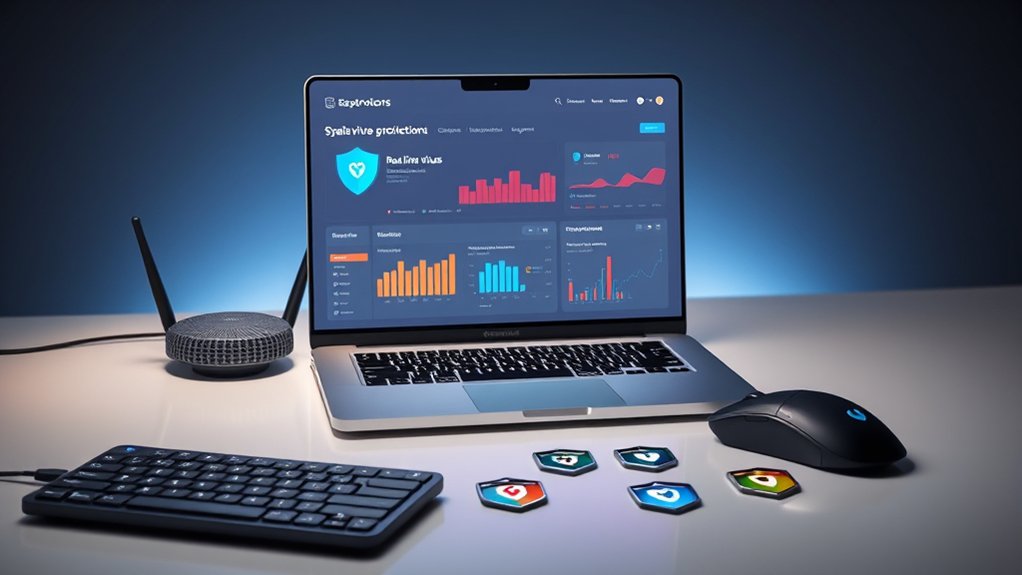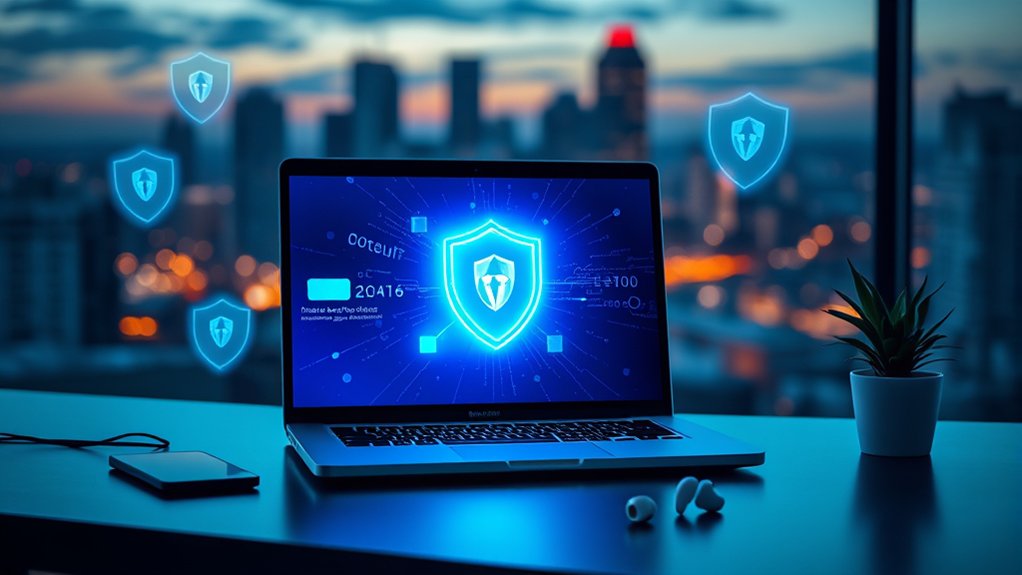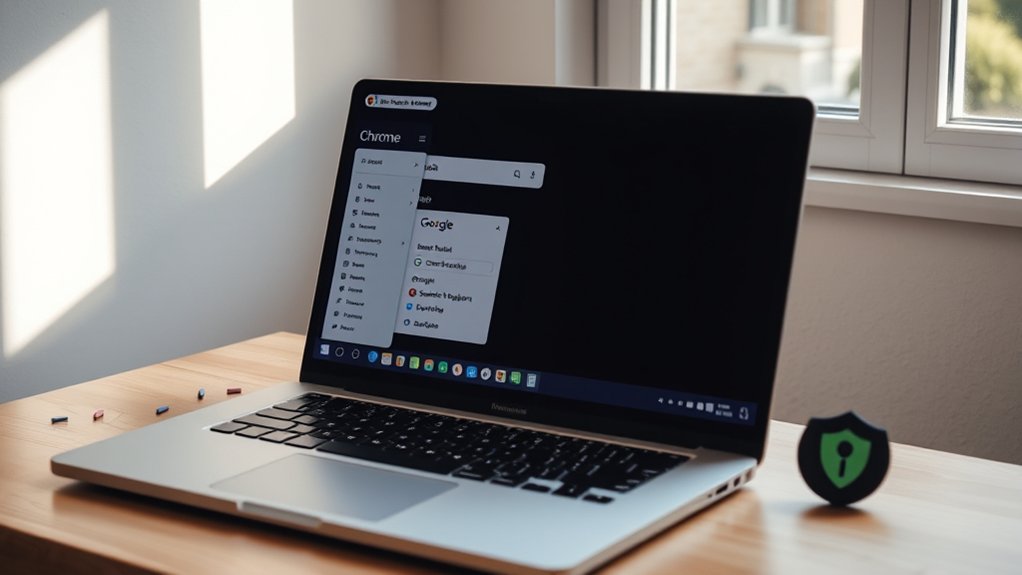In 2023, Norton, Bitdefender, and ESET emerge as leading antivirus software choices. Norton boasts a perfect 100 rating for protection and performance, offering compatibility with multiple operating systems and additional identity theft protection through LifeLock. Bitdefender is noted for its high malware detection rates and minimal system impact. ESET is recognized for its efficiency and rapid scanning capabilities, compatible across various platforms. For a thorough understanding, further details on their specific features and pricing can improve user selection.

As cybersecurity threats continue to evolve and proliferate, selecting strong antivirus software has become increasingly critical for users across various platforms. In 2023, several antivirus options stand out for their extensive array of features and strong performance.
Remarkably, Norton Antivirus offers extensive compatibility with Windows, Mac, iOS, and Android systems, featuring a built-in firewall, VPN, and password manager. Its integration of AI technology for threat detection further improves its capability, supported by high performance ratings in AV-TEST evaluations. Additionally, Norton utilizes advanced machine learning technologies to effectively track and tackle dangerous files. Notably, Norton 360 is recognized for achieving a rating of 100 in protection and performance, reinforcing its status as a top-tier choice. Furthermore, its solutions help to maintain online safety in an increasingly digital world.
Norton Antivirus excels with broad platform compatibility and advanced AI-driven threat detection, ensuring top-notch protection across devices.
Bitdefender Antivirus presents another strong contender, renowned for its exemplary malware detection rates. Additionally, it includes practical features such as battery-saving mode and integrated password management, appealing to a wide range of users. AV-TEST reports confirm its consistent top performance in industry trials, highlighting both low system impact and effective protection.
ESET NOD32 has gained recognition for its resource efficiency and rapid scanning, whilst providing strong web protection. It supports multiple operating systems, including Windows, macOS, Linux, and Android.
Trend Micro Antivirus, conversely, highlights online banking security through real-time alerts and monitoring, catering particularly to users engaged in financial transactions on the Internet.
For those with basic needs, Avast Antivirus delivers solid protection with minimal system impact and offers a free version. It remains compatible across various platforms and is commended for its user-friendly interface.
Additional features from these software options further improve their value. Norton includes identity theft protection via LifeLock, whilst Bitdefender provides secure banking tools. ESET integrates web access protection and antispam capabilities, with Trend Micro focusing on safeguarding online shopping activities.
Pricing varies among these offerings; for example, ESET NOD32 begins at $34.99 per year, often accompanied by substantial discounts.
As a result, users seeking effective antivirus solutions in 2023 have a multitude of reliable options to evaluate, each tailored to distinct needs and environments.
Frequently Asked Questions
How Do I Know if I Need Antivirus Software?
Determining the necessity for antivirus software involves evaluating several factors. Indicators include outdated software lacking updates, recent virus infections in spite of existing protection, and reliance on free versions that may lack advanced features.
Cybersecurity experts highlight the importance of thorough security features, such as real-time scanning and ransomware protection.
Furthermore, increased vulnerability of devices, particularly Windows and macOS systems, further necessitates strong antivirus solutions to safeguard against evolving cyber threats.
Can Antivirus Software Protect Against Phishing Attacks?
Antivirus software is typically ineffective against phishing attacks. Phishing exploits human psychology, tricking users into downloading malicious software; traditional antivirus solutions often fail to detect these threats since they rely on malware signatures.
According to cybersecurity experts, thorough protection requires additional measures, such as anti-phishing tools and user education.
Research indicates that combining various security solutions provides a notably lower risk of successful phishing attempts, emphasizing the need for multi-layered security strategies.
What Is the Difference Between Free and Paid Antivirus Software?
The distinction between free and paid antivirus software lies primarily in their features and protection levels. Free versions typically offer baseline malware detection but lack advanced features such as real-time scanning and ransomware protection.
Conversely, paid software provides extensive security, including phishing shields, webcam protection, and dedicated technical support.
According to cybersecurity experts, users dealing with sensitive data might prefer paid solutions for improved security and compliance with regulations, ensuring better overall protection against evolving digital threats.
How Frequently Should I Update My Antivirus Software?
The frequency of antivirus software updates is critical for ideal protection against emerging threats.
Experts recommend enabling automatic updates, which guarantee that virus definitions and software patches are consistently current.
Furthermore, users should perform regular system scans, ideally weekly, to identify and eradicate any threats.
Importantly, outdated antivirus can leave systems vulnerable to new malware, potentially resulting in significant data breaches and system instability, as highlighted by cybersecurity professionals.
Will Antivirus Software Slow Down My Computer’s Performance?
Antivirus software can potentially slow down computer performance, especially when it utilizes significant system resources. Factors include background scanning, real-time protection features, and additional software components.
For instance, Norton, although thorough, may cause noticeable delays if not managed properly. Conversely, lightweight options like AVG and ESET minimize this impact.
Regular updates and customizable settings further improve performance. Users should assess their systems to balance security needs against potential performance trade-offs.









